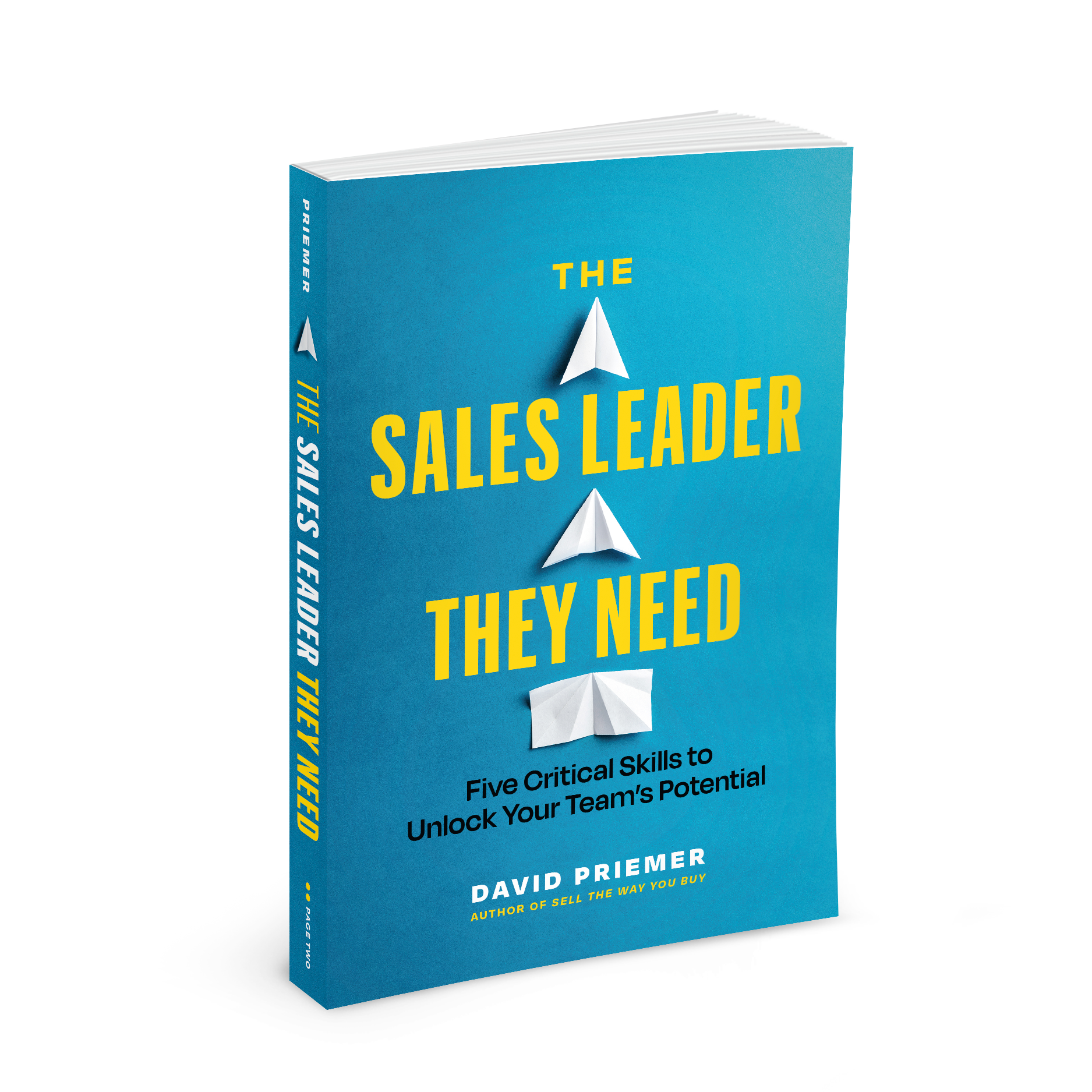7 Entrepreneurial Lessons Learned from Starting My Own Sales Practice
“What if I fall? Oh but my darling, what if you fly?”
– Erin Hanson
In late 2017, after almost two decades in B2B software sales leadership across 4 start-ups, two acquisitions, and one IPO, I finally decided to live my passion full-time and start my own practice.
My mission: to empower armies of modern sellers to sell the way they buy by harnessing the power of science and empathy. The side benefit; stamping out crappy, old-school tactics that cast a shadow on the profession I’ve fallen in love with!
It was the best decision of my career.
Having started out as a research scientist, I’ve always been very curious and a bit of a learning junkie. And on the learning front, this journey has not disappointed. Some lessons learned were focused on the mechanics of building a solo venture (a new experience for me). Others underscored the importance of the fundamental sales lessons learned over the years.
Since starting my business I’ve connected with many aspiring solo artists looking to do the same, so I decided to share part one of those key lessons on building a solo venture:
1. Your network is your net worth
Just because you decide to go out on your own doesn’t mean you have to do it alone. In the early days, the strategic and tactical support from the community of friends and professionals around me has been tremendous. From hosting me on their podcasts to proofreading my articles and sharing advice and lessons learned from building their own ventures, I’m truly grateful for this amazing community. My advice to those starting out (or thinking of it); a vibrant, healthy network can be a huge force multiplier for your business. Proof: in the first year of business, 60% of my revenue came from my existing network.
2. Your content should help you scale
I’ve been writing and creating content for years as a side passion during my previous sales leadership roles. It was never a money-making proposition. I did it to share and help. When I started my business, I doubled down on that content strategy by writing new articles that supported my training and speaking activities. I also launched a YouTube Channel and created 50+ videos (so far) to provide a complementary outlet of easily consumable and shareable content.
This has been a winning strategy (as it can be for you) for three reasons. First, it can help you cultivate your passion. To find your voice and perspective and crystallize the subject matter you want to build your business on. Second, helpful content acts as a lightning rod, connecting you with an audience of like-minded sales professionals and building a community for your solution (at scale). I was grateful to receive many notes from salespeople and leaders saying things like “I shared your latest video tip with my team at our weekly meeting and they loved it!” or “Our team found that the approach you shared works really well with our customers“. And finally, it helps build reciprocity. When you create content that others find valuable, they are more likely to take your calls 🙂
3. Growth is about maximizing the RIGHT revenue
In 2010 when we were building our third start-up our team collaborated with preeminent business author and executive coach to the world’s most prolific CEO’s, Marshall Goldsmith. At that time, Marshall charged $250,000 for a CEO coaching engagement and offered a 100% money-back guarantee if his customers weren’t satisfied. When asked how he supported that kind of offer. He said, “Simple. I only work with great leaders who want to get better”. That’s easy for him to say, I thought. After all, when you start a services business with zero revenue, your first hope is that someone simply pays you to do anything!
While I’m grateful to have signed my first client even before I opened my doors on day one, what I soon realized was that if I wanted to grow my business in the right way, it wasn’t about taking on as many clients as I could. It was about taking on the right clients. Clients who were aligned with my vision and brought the right energy. Clients at the right size and scale to take advantage of my services. And of course, clients who would also challenge me to up my game, accelerate my passion for learning and point the trajectory of my business in the right direction. As marketing strategist, Dorie Clark, states in her HBR post, “revenues are always important, but in some cases, other variables may be even more critical”. Make sure you take on the right clients.
4. The most valuable skill: learning how to learn
When hiring sales reps at my start-ups I always looked for doers. People who didn’t need to be given a manual or playbook to know what to do. Rather, those with the desire and ability to blaze the trail. To acquire the skills needed to build the bridge as they walked across it. The same thing applies when starting your own business. You need to wear many hats and do many things. While over time you may decide to outsource certain responsibilities, having the ability to acquire new skills will help you get going quickly.
Whether it’s building a website, publishing content, editing videos, organizing events, or even operational tasks like billing and invoicing, if you crave a high degree of visibility and control in the early stages of your business, the number one skill that’s required is learning how to learn.
Note: if you ever run into my kids, ask them which skill their Dad tells them they’ll need in order to be successful in the future. They’ll say this!
5. Make time to read and get smarter
With all the things you need to do to get your business off the ground, it can be tough to carve out time to do something as sedentary as reading. But you need to! I’m a huge proponent of the power of reading and the impact it can have on rising to the top of the sales profession, but when it comes to starting your own business, regularly consuming relevant subject matter is critical for two reasons.
First, you simply have fewer peers to learn from on a daily basis. Reading exposes you to the insights and knowledge you need to learn and grow personally and professionally. Secondly, being in business is all about helping your customers solve their problems. Problems they can’t solve on their own. Problems you wake up every day crafting and refining solutions to. If you’re not constantly expanding your sphere of knowledge in the area of those problems, their causes, and solutions to them, you will never be able to bring the future to your customers.
Note: if you’re looking for a list of my favorite sales reads you can find them here.
6. Protect the house!
Sometimes being an entrepreneur is like spending summers in Northern Alaska. There’s always something you could be doing and with 80 days of uninterrupted sunlight, if you’re not careful you could end up working around the clock! Unfortunately, if excess stress causes you to be sick, unfocused, or off your game, the business doesn’t move forward (especially if you’re a solopreneur). Protect your physical and mental well-being and develop routines to ensure you stay focused, healthy, and sharp. Work is important (and I work a ton) but so is exercise, family time, and sleep.
I make it a point to hit the gym three times a week. I attend all my kid’s performances and school events. When I’m not with clients and working from my home office I try to block out the 15-minute window when my kids arrive home from school so I can greet them (a little thing that means a lot to both of us). And to help keep me accountable to my sleep schedule, I borrowed an idea from a great HBR post; Why You Need an Untouchable Day Every Week. I created a recurring daily calendar invite that triggers every day at 10:30 PM and says in all caps (as if it’s screaming at me): “YOU SHOULD BE SLEEPING BY NOW!”. It’s amazing how well that works!
7. Growth and fulfillment lie on the other side of fear
It’s true what they say about comfort zones. Nothing good ever came from them. As a four-time start-up guy, I was no stranger to change and challenge. I often invited it. But stepping away from a senior, quota-carrying leadership role to start your own business can be a daunting proposition. Will people like what I do? Will I generate enough revenue to support my family? What if the business doesn’t perform consistently? Like most fear-based objections, you can rationalize and unpack them, ultimately coming to grips with the fact that the worst-case scenario isn’t usually catastrophic. But oftentimes, if you truly want to see what’s on the other side of your fear, you simply have to jump!
My best advice for those trying to reconcile their fear and decide if they should go out on their own? Take the reverse angle. Don’t ask yourself “Should I do this?” You can probably come up with tons of reasons why you shouldn’t. Instead ask yourself, “If I don’t do this, will I regret it?”. If the answer is yes (as it was with me), take the steps to set yourself up for success, then do it! I promise you will never regret it!
We promise never to send you junk or share your email! Just helpful sales insights.














This is very well put Dave. Real lessons and tremendous value. Thank you for sharing.
My pleasure Jeff! Glad you enjoyed the post.
Great piece! The lesson on networking particularly resonated with me as somebody who has so often adopted the “lone wolf” mindset when taking on new projects.